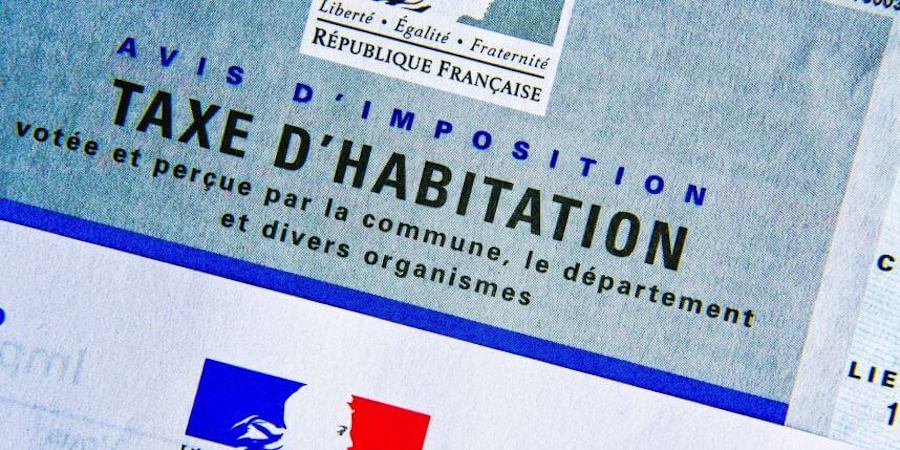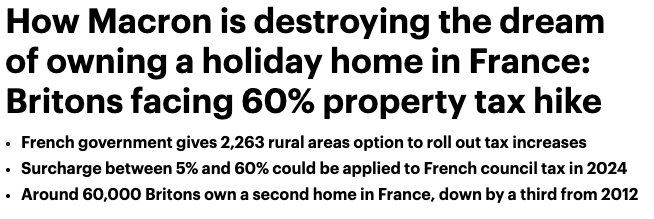Everybody’s cheering! The president of France, Emmanuel Macron, kept his campaign promise to completely eliminate the dreaded taxe d’habitation, a sizable charge excised on all residents across the entire country.
Hurrah!
Wait a minute, hold the applause: We hear some grumbling.
It will not be eliminated for a certain demographic. The bad news is — it’s probably YOU.
It doesn’t matter if it was the house you grew up in or a beach vacation residence, if you don’t live in it full-time, you’ll have to pay. Combien? Well, the bureaucrats are still sorting it out. The government is almost finished collecting data for the matrix that will decide who to include, who to exclude and how much to charge. In some cases it will be hefty, which has some taxpayers antsy.
According to the official website: “The housing tax on the main residence has been abolished for all taxpayers. However, it is maintained on second homes.” If there is a demand for housing that cannot be met in your region, look out. Expats in Bordeaux, Paris and the Côte d’Azure are bracing themselves.
The tax starts at a 5-percent increase and goes up to a whopping 60-percent increase over your previous tax bill in areas with shortages.
So, if your previous bill was 800 euros, the new law would mean an increase of up to 60 percent to as much as 1,280 euros.
Why now?
The idea is to push taxpayers to flip (or lease) their property by slapping them with a substantial tax burden on unoccupied homes. Lawmakers believe that this will alleviate the housing crisis by freeing up real estate.
Urban areas on the list that have been hit the hardest are:
Ajaccio, Annecy, Arles, Bastia, Bayonne, Beauvais, Bordeaux, Draguignan, Fréjus, Genève–Annemasse,
Grenoble, La Rochelle, La Teste-de-Buch–Arcachon, Lille, Lyon, Marseille–Aix-en-Provence, Meaux, Menton–Monaco, Montpellier, Nantes, Nice, Paris, Saint-Nazaire, Sète, Strasbourg, Thonon-les-Bains, Toulon, and Toulouse.
Focus is also on mid-sized tourist towns. About 4,000 more areas have the option to join the list of “zones tendues” ( literally tense areas). These are mainly coastal and mountain areas with a population below 50,000. Folks who bought property in less dense rural countryside with a population under 1,000 people may have fewer worries and hopefully less taxation. But those affected are still nervously waiting for their November tax statement.
The French aren’t kidding around about this
Albert Einstein once said that “the hardest thing in the world to understand is the income tax.” And for expats, foreign homeowner taxation can be just as tough. If you own or are thinking about buying property in France, you’ll want to get a grip on updates in property taxes.
No matter what, home owners in France are now required to submit a questionnaire to the French tax administration about their real estate (including vacant premises/homes). If you are a owner or renter, you should have already filled out the déclaration d’occupation et de loyer from the Direction Generale des Finances Publiques in France.
The owners of a built property must give information to the tax authorities citing:
• who occupies the premises (personally or by third parties); whether it is a main residence or secondary residence and if it is rented out, if it is occupied free of charge, or vacant (unfurnished and unoccupied).
• identity of the occupants (full name, date of birth, place of birth / legal person: name).
• the period of occupation (or vacancy) of the premises they own (beginning, end of the period of occupation).
• seasonal rentals: the start of the seasonal rental period and the terms of management of the property (in-house or rental contract with manager excluding any personal use), the possible classification as furnished tourist accommodation, the monthly rent excluding charges (optional)
Other factors to keep in mind:
• If you plan to rent out the property, you will need to file a French income tax return.
• All property owners still pay the yearly land tax, Taxe Fonceire. It’s paid by the owner (even if there is no house on the land).
• If your property is worth more than 1.3 million euros you will probably have to pay a wealth tax.
• You are considered a resident in France if you live in the country for at least six months throughout the year. Some conditions apply. French authorities can review your circumstance to determine residency if need be.
• You can be a tax resident in more than one country. If your personal circumstances put you under double taxation, check the agreements to ensure that you are not being taxed more than once on the same income.
Note: the USA, the UK, New Zealand and Australia are on the list along with approximately 120 other countries.
Read more here in plain English on how it works.
––––––––––
Read more about France here in Dispatches’ archives.
Alice Verberne is a contributing writer for Dispatches Europe. She has worked in print journalism and magazine production in the United States and Europe throughout her career. She currently resides in France where she enjoys visiting former French speaking colonies and discussing history with the locals.
















